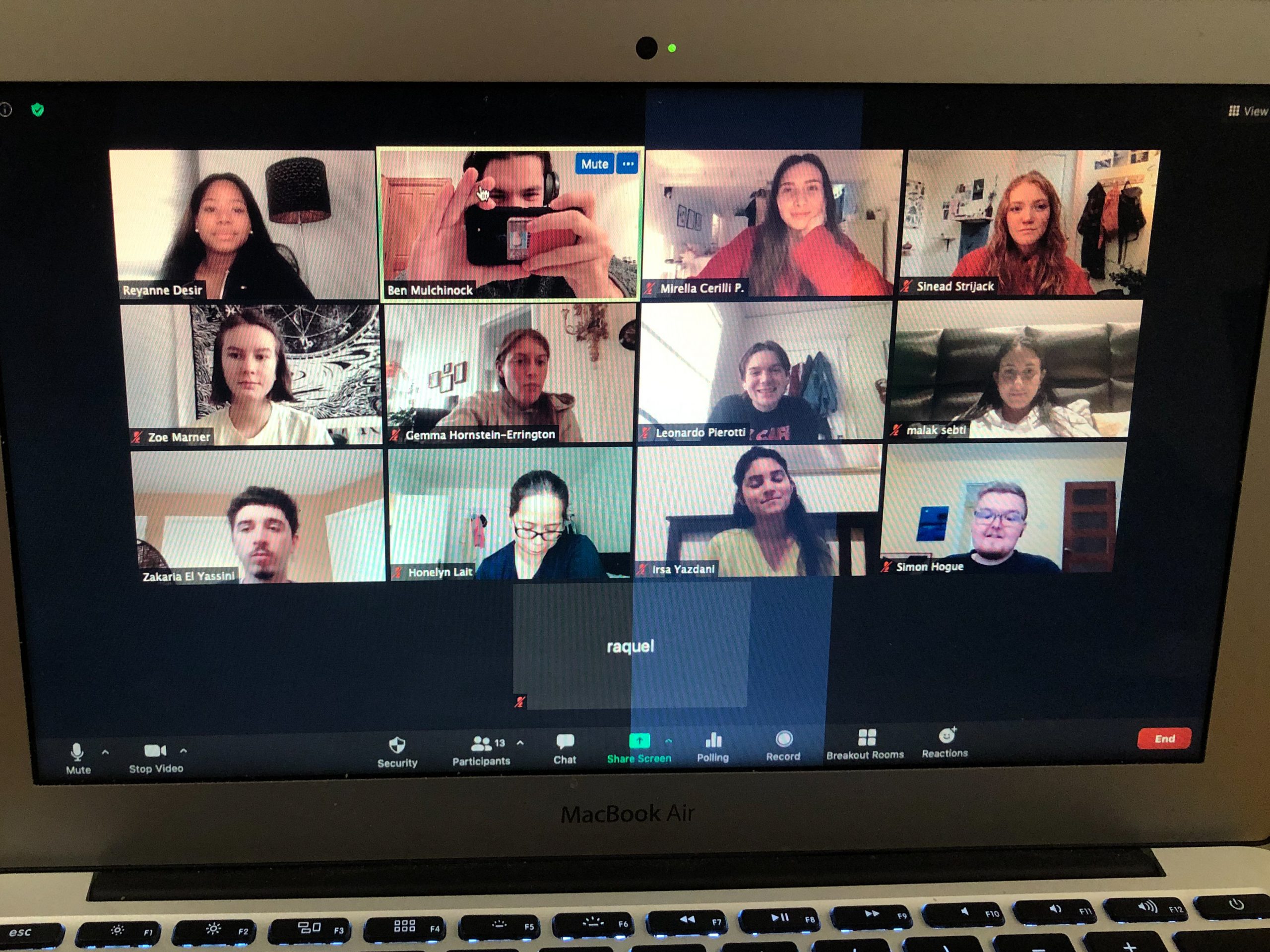Hundreds of students and activists converged to “reclaim the streets” in downtown Montreal last Thursday to denounce the lack of transparency under which they say the Free Trade Area of the Americas (FTAA) is being negotiated, and to create a space of popular education.
The Anti-FTAA demonstration drew under 1,000 people in the cold and Metro-less city in what organizers say was a disappointing turn out.
Last year’s October demonstration saw 10,000 people snake their way from Concordia all the way to the Montreal Trade Centre.
Those attending this year’s demonstration were nevertheless enthusiastic, chanting, singing freedom songs and sharing stories from the FTAA protests in Montreal last year.
There were a few musical instruments present including drums, acoustic guitars and people playing badminton.
Pedestrians were curious and some stopped to talk with protestors, and a number of drivers passed by and honked their support.
A few of the signs spotted stated “Democracy only works when politicians listen” and “Water is for LIFE not MONEY,” and “No to the FTAA,” and “People Before Profit,” as well as somebody carrying the American flag upside down.
The Anti-FTAA Montreal march coincided with protests from around the world to coincide with FTAA negotiations that were held in Miami on Nov. 20 to 21.
“The proposed FTAA is one of the most important issues of the day, and if implemented, would be the largest “free trade” block in the world,” said Canada’s Trade Minister Pierre Pettigrew, in a CBC interview.
The effort to bind the economies of the Western Hemisphere into a single free trade agreement began at the Summit of the Americas, in December of 1994 in Miami, Florida.
It was at the summit that heads of state and governments of 34 countries in the region- all nations in North, Central and South America and the Caribbean except Cuba- agreed to complete negotiations for a Free Trade Area of the Americas by 2005.
The FTAA is supposed to be an extension of the North American Free Trade Agreement (NAFTA), which was signed in 1994 by the United States, Canada and Mexico to try to break down barriers, lower tariffs and guarantee access to one another’s markets.
The FTAA goals would be similar to that of NAFTA. The one and only difference is that trade ministers want to establish free trade in 34 countries in North, Central and South America and the Caribbean. This agreement would make the FTAA the largest and most comprehensive free trade area in the Western Hemisphere.
But trade ministers in Miami in a last minute deal settled for a more modest Free Trade of Area of the Americas by January 2005.
Ministers agreed to reduce the “NAFTA on steroids” plan that would see only a minimum of trade concessions, such as tariff reductions on industrial goods and agricultural stock so hotly debated throughout the FTAA talks.
The FTAA proposed agreement, protestors claim, works to drive and centralize both capital and the means of production by ensuring the disengagement of state in all areas of development.
This means the “big players” pull the strings when it comes to opening up new resource markets in the Western Hemisphere, and not government.
That’s not the only issue
But the largest criticisms are not what is being negotiated, but what is not being negotiated.
Topping the list of worries shared by many is whether corporations would start paying some attention to other important long-term international, economic and environmental issues which have been further relegated to the back burner by the FTAA.
For example, Third World demands of hundreds of millions of women for access to safe and inexpensive contraceptives.
Claire Rose, who has a degree in women’s studies from the University of British Columbia was one of the marchers in Montreal.
“Programs that allow women to stabilize family size and concentrate on nurturing their existing children are inexpensive and can have a dramatic effect on fertility rates and go a long way in contributing to, and sustaining economic livelihood,” she said.
“I am here because I feel the FTAA is moving too fast and forgetting past agreements.”
Many people at the demonstration thought that a pre-requisite for membership in the FTAA should include that the rich countries in the Organization for Economic Co-operation and Environmental Development, actually fulfill their quarter-century-old promise to allocate 0.7 per cent of gross domestic product annually to development aid.
“This aid money should be spent efficiently and appropriately, instead of falling into the wrong hands or being devoted to the wrong purposes,” said Destron Miller, a member of Root Cause, based in Miami.
“The fact is many international agencies invest in ambitious, technologically inappropriate schemes; channel funds to highly paid consultants and local leaders and ignore the ideas of local and indigenous peoples, a practice that is being promoted by FTAA supporters,” he said.
“Meanwhile, poor countries are often corrupted and oppressed squandering their treasures and their resources because they are dependent on historic, unfulfilled promises by the rich countries.”
Representing Earth First, a new environmental activist group in Montreal, was Marie Champagne.
“We are here today because we believe the FTAA is backed by big greedy corporations with no interest in preserving the natural environment.”
Champagne is referring to NAFTA’s Chapter 11 on investment, or the so called “investor-state” that gives corporations one of the biggest weapons they have–the power to sue governments for regulations or policies that infringe on their profits.
“The new agreement will only be a copy and paste of Chapter 11,” she remarks.
Metalclad, a U.S.-based waste disposal company, sued the Mexican government for shutting down one of its waste disposal facilities in a Mexican state.
The site had been closed down after a geological survey found that it would likely contaminate the area’s water supply. Metalclad won, and the Mexican government was forced to pay $16.7 million in compensation, despite the fact that the government was acting in the best interest of its people.
“If governments in local countries decide to withdraw or closed down a production project, such as oil exploration—a nasty undertaking that leaves rain forests crushed in its wake–corporations investing will be permitted to sue governments,” Champagne said.
“Governments are less likely to choose the environment over losing money.”
“I think many people understand now what the FTAA is,” said Melanie Larose, a CEGEP student. “Many pedestrians stopped and talked with us and were surprised to hear about the FTAA and what they were doing in Miami.”
Milena Turcotte, who works downtown didn’t seem bothered by the demonstrators.
“I was at first concerned that they would cause some damage,” she said.
“But I saw that some of the demonstrators were young people and they were peaceful. Sometimes young people have to get involved and have a say.”
The march did not go without incident. An MUC Police motorcycle was damaged by some over enthusiastic demonstrators, and some garbage pails were knocked over but no one was arrested and the march ended peacefully.
“Even though the turn out was small…it was worth it,” said Champagne.



